Anne-Laure Le Cunff
Tiny Experiments: When the Framework Feels Bigger Than the Idea
Anne-Laure Le Cunff’s Tiny Experiments: How to Live Freely in a Goal-Obsessed World has been everywhere lately. Well on my social media it has and as someone who loves her work at Ness Labs, I picked it up with high expectations. Her “PACT” framework (Purpose, Action, Consistency, Time) had already made an impression on me in one of her online workshops, so I was curious to see how it would unfold in book form.
And… well, it’s complicated.
The big idea
At its core, Tiny Experiments encourages you to replace rigid goals with curiosity-driven exploration. Instead of saying, “I’ll write a book this year,” you design a “tiny experiment”: maybe writing a page a day for a week, then observing what you learn.
It’s about shrinking ambition down to something playful, possible, and short, just long enough to test whether an idea fits your actual life. As she puts it, every small pact is “a chance to inspire and elevate others… your career is no longer a linear ladder you climb alone, but a nonlinear path of shared discovery.”
That framing genuinely resonates. It’s what makes Le Cunff’s thinking stand out in a world obsessed with outcomes and personal branding.
Where it lost me
Still, somewhere between the framework and the storytelling, the focus gets blurry. The book is packed with examples so many that I often lost the thread of what she was trying to say. The anecdotes sometimes feel more like proof of concept than illustration
It’s a shame, because Le Cunff shines in short-form writing. Her essays distill ideas about creativity, curiosity, and learning in such elegant bursts. Here, though, the structure wobbles; it’s as if she wanted to fit every insight into one volume rather than trusting the simplicity of her own framework.
For readers new to these ideas, it may still land beautifully. But for those of us who’ve been swimming in the Atomic Habits of life, it might feel like déjà vu: interesting concepts that could’ve used more depth or tighter editing.
Tiny experiments, big takeaways
What surprised me most was how my own reaction became a kind of experiment. I found myself trying out her “Persist, Pivot, or Pause” cycle with a few creative ideas. In just a few weeks, I learned what stuck, what didn’t, and where I was simply forcing something out of habit.
Even when the book frustrated me, it still prompted reflection, which is a success in itself. That’s the charm of Le Cunff’s approach: it gets you thinking differently, even if you don’t love how it’s packaged.
A few lines that stayed with me
“The clearest sign of intellectual chemistry isn’t agreeing with someone. It’s enjoying your disagreements with them.” — Adam Grant, quoted in the book
That’s exactly how I felt reading Tiny Experiments: curious, occasionally frustrated, but engaged enough to keep the conversation going.
“No matter how isolated you are and how lonely you feel, if you do your work truly and conscientiously, unknown friends will come and seek you.”
That line reminded me why I love reflective books like this. They help you feel less alone in the creative process, even when you’re questioning it.
And this one hit a little too close to home:
“Our ancestors’ daily routines included organic opportunities to shape their inner world… But we in the present day have largely lost those quiet natural pauses.”
If nothing else, Tiny Experiments nudged me to reclaim those pauses. Even a few minutes away from screens to let my thoughts wander.
Final thoughts
I wanted to love this book more than I did. The framework is inspiring, the science is solid, but the execution felt uneven. Still, if you’re curious about experimenting with your habits, or simply want a nudge to make life a little less linear, Tiny Experiments might be worth a read or at least worth a “tiny experiment” of your own.
